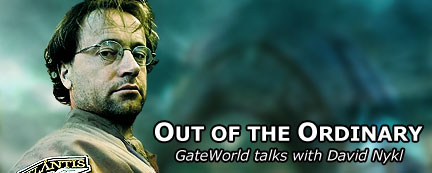
For five years, Dr. Radek Zelenka served as an invaluable scientific resource for the Atlantis expedition — always level-headed, always standing by to help solve a crisis or keep Rodney McKay in check (… or should that be “Czech?”).
GateWorld caught up with the inestimable David Nykl at Creation Entertainment’s 2009 Vancouver convention in April! In this interview, David talks about the fifth and final year of the show, his character’s relationship with the rest of the Atlantis team, and what he’s working on now. He also reflects on Zelenka’s growth over five years, and the role that Atlantis has played in his life and his career so far.
If you have not seen Season Five of Atlantis yet, beware that this interview does include SPOILERS for several episodes.
GateWorld’s interview with David runs about 14 minutes. Listen online at your leisure, download it to your MP3 player, or subscribe now to the GateWorld Interviews podcast on iTunes! The full interview is also transcribed below.
GateWorld: When we last talked, back in Chicago in August about seven months ago, Atlantis had gotten about a quarter of the way through Season Five as far as [what] had hit the air at that point.
David Nykl: Yeah, that’s right.
GW: What were some of your thoughts on Season Five as a whole … as far as its strengths and weaknesses?
DN: I think what caught us out was the end — that we didn’t know that was happening. Which happens, I guess, to series that are in a similar situation.
Generally, it was a terrific season. It was a great season for Zelenka. Some really terrific scripts from [Joe] Mallozzi, from [Paul] Mullie, from [Carl] Binder, from all of them. The ending seemed a bit abrupt. It seemed like everything was kind of packed into the last episode.
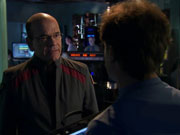
In the series finale Zelenka offers Woolsey Rodney McKay’s plans for the wormhole drive.
GW: To me, it really felt like it should have been a two-hour …
DN: Yeah.
GW: Not necessarily rushed, but very compacted.
DN: Yeah. Very compacted. Kind of the deus ex machina thing of the wormhole drive and everything sort of happening as compactly as that. So that was a little thing.
I kind of regret a little bit that the Zelenka character didn’t get sort of tied up in any kind of way. That it was just sort of left hanging a bit as to what happened to him and where he got to. But who knows? That might still come out in the movie.
GW: Is there any certain episode over the course of Season Five that stands out in your mind for Zelenka? He obviously made an important contribution at the end with the wormhole drive and getting back to Earth.
DN: Kind of the Zelenka thing — I remember “The Seed” right off the top — it was kind of the year that Zelenka got “whumped” [beaten up] a little bit more.
GW: [Laughter]
DN: Bolts of lightning, tendrils of gooey stuff … ooh, even stabbing [“Identity”]. Even a stabbing from Jennifer Keller. I just like her to stab Zelenka! Ha ha ha! Kidding, Jewel! [Laughter]
GW: Did you feel at all in the script, with the introduction of the wormhole drive, that line just kind of came out of left field as far as…
DN: Yeah, a little bit. But that’s just the script. The writers have a reason for why they put that [in].
I think that Joe [Mallozzi] was in the same sort of situation as all of us. To tie it up and do it quickly because this looks like to be the end. So I know that he was disappointed as we all were that it’s coming to an end. So I guess it was to try to address certain issues at once, and that’s, I think, where the rushed feeling comes from. I don’t think you can fault him for that. It’s just the nature of how it was all tied together.
GW: How would you compare Season Five to the earlier four seasons, especially in terms of leadership? You had Torri [Higginson] as Weir, then Amanda [Tapping] [as] Carter, and then Bob Picardo…
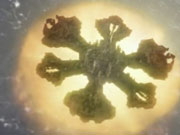
Though an abrupt ending for the series, “Enemy at the Gate” managed to tie many loose ends.
DN: Yeah, it changed around. And we didn’t really have too much of a chance to settle in with Bob Picardo. I mean, really, it’s almost like there [were] different eras. There was the Torri era, and then the Amanda era was kind of a transitional thing to settle into the new Picardo era, which then abruptly ended.
The ending, from a leadership point of view, was a little bit up in the air. Which is good in terms of the team and developing the character team. It just maybe had left a little bit of a sort of uncertainty as to what’s going on up top, in terms of that.
GW: Do you feel like the series, by the end of Season Five, had hit its stride? That it wasn’t necessarily ready [to be cancelled] …
DN: Yeah, definitely. I mean, not only had we hit our stride, but it was such a [good] chemistry between the characters. The problems we had started to introduce, like the whole Asgard characters that were in the new suits and all that. So it felt like Season Five, we were setting up stuff that then had to rapidly get chopped down.
I’m holding out hope — I keep saying the movie — that these things will be addressed in the movie. Because there are some open-ended questions. The Replicators, I think, are sorted. But the Wraith aren’t. And neither are these new bad guys.
GW: Have you heard anything at all in terms of a start date for production? I know we had seen they were kind of looking at a spring [date] as far as getting things going.
DN: Yeah, but that’s no longer I think the case. I don’t know anything more than you guys would know. I go to GateWorld to get my information. [Laughter]
GW: You heard it here first!
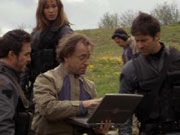
Zelenka was often called in to solve problems when McKay was occupied.
DN: As far as the script goes, I’m not even sure if it’s completed yet, or if it’s written yet. [As of May 2009, the film’s script has been completed. – Ed.] Of course, then getting all the rest of the actors together and putting it all together …
GW: It takes time.
DN: It all takes time, yeah. It all takes time. So hopefully.
GW: The character of Zelenka started out just as a bit player in “Thirty Eight Minutes,” back in Season One. And over the course of five years, he evolved into so much more. You averaged basically half a season [of episodes] each year. Over the course of five years, [a] wonderfully realized character. How did you approach the role and what do you think spurred his popularity?
DN: Well, thank you for saying that. It’s difficult for me to assume what the popularity was based on.
Certainly, the approach that I had to it was to try to be the everyman in such extraordinary circumstances. Not the hero who can figure it all out. Not necessarily the brave guy who can overcome it. Just an ordinary scientist who’s now in one of the best labs in the world. One of the most fascinating places to be. Not even in the world. In the universe. Let’s go with that.
My approach is always to be humble towards the surroundings. And intrepid — as intrepid as possible — as the science can dictate. And with respect to the character. I think to caricature, or to assume a relationship that isn’t there doesn’t do the character any favors. And doesn’t do the writing any favors as well. So, honor the writing as much as you can, and honor the character.
GW: And the rest comes naturally.
DN: And the rest comes naturally.
GW: Were there parts of Zelenka’s character that you wish you had more time to develop on-screen that you didn’t get [to]?
DN: Yeah. I was really happy for the work I got to do with David [Hewlett]. I wish that there was more opportunities to work with some of the other characters. Notably Ronon and Teyla, whom I didn’t get to see much of on-screen. I certainly talked with them a lot on set, but didn’t get a chance to work with them that much.
I was hoping for some more time also to develop a working relationship with Picardo. I should say with our captain. [Laughter]
I was hoping that could develop more. So yeah, more. More character development. More relationships with the other characters. But I guess every actor will tell you that.
GW: You’ve done a ton of stage work over the years. And you’ve a company in Prague, a theatre company that you co-founded. Where do you feel most at home? In front of the camera in TV or movie roles? Or under the lights of a stage, whether on it or directing?
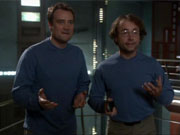
Hewlett and Nykl will appear Ashley Judd’s Helen, which has already been filmed.
DN: That’s a good question. There’s such a difference between stage and film. And a lot of actors will tell you that they are apples and oranges. Theatre is a direct feedback. You’re right there with the audience. You’re working there with them. It’s all done in one go, it’s all in one take. So it’s much more performance driven.
Whereas television is piecemeal. It’s put together from bits and pieces. You still have to be there, but it’s much more minimal, and it’s much more about the thought processes that are going on. Two different approaches to the same phenomenon. Preferring one is like preferring which kid is your favorite. They’re both terrific.
I really enjoy acting. Specifically about the acting, I’ve not tried to go on beyond that. Simply because it’s one of the best jobs in the world. It’s just hard. You’re always the girl at the dance that has to be asked to dance, being an actor. You have to wait for the work to come.
GW: Now, you’ve got a movie that I think just hit Sundance [film festival] back in January called “Helen.” You did it with Ashley Judd and Goran Visjnic.
DN: And David Hewlett! [Laughter]
GW: And David Hewlett! What can you tell us about it? Is there going to be a wide release as far as you’re aware of in North America?
DN: I understand that that’s what they were aiming for. It was incumbent on what they managed to do at Sundance. As far as I understand, Sandra Nettelbeck, the director, had ambitions to do that. To release it as a wide release.
Difficult film. It’s about depression and difficulties of depression. I think Ashley did an absolutely tremendous job of it, from the bits that I’ve seen. I’m looking forward to it coming out.
GW: You play a character…
DN: I play her best friend.
GW: Any other upcoming projects that you have?
DN: How many times have you guys mentioned The Beast of Bottomless Lake? This is the ongoing thing. The more I mention it, the more likely it is to come out, right?
It’s an independent film, so it’s a labor of love. We’re trying to get it together as best as we can. So we’re trying to get some visual effects shots, which cost money and take time. I understand that it’s about tied up right about now. So we’ll be able to start going to the festival circuits. So within half a year, hopefully you’ll be able to see it out there.
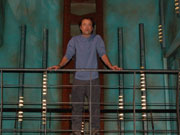
Nykl surprises fans with a special in-costume photo-op during Creation’s 2009 Stargate convention tour of the Atlantis sets.
GW: [Darren] I’m going to try to give you a profound question.
DN: OK. Profound question from Darren.
GW: You’re going to be really mad at me for asking this, but … when you reflect back at five years on Atlantis in five years, or 10 years, or 20 years — what do you think is going to come to your mind about this experience? What role has five years on Atlantis played in your life personally and in your career?
DN: Well, that’s a good question. What role has Atlantis played in my life?
Well, ten years from now, I hope to be able to tell you that [deepens voice] it launched a successful acting career. It would be disingenuous to say it didn’t do anything. It’s been phenomenal. I’ve got to meet so many fans and travel the world. And see so many fans, that I’d never have thought of before.
I think what happens a little bit — and I admit this happening to me — is that acting is in such a way a very sort of concentrated process a bout getting work, and finding work, and doing work. And I didn’t really give much thought as to what would happen at that being successful and what people would think of it.
So it’s like the division between the working and the reception of the work. And that surprised me. I didn’t expect it to be as big, as huge, and as successful as it was.
So a tremendous surprise. A very pleasant surprise. A blessing, as it were. I’m very happy to have done the five years on that. I’m thankful for the work. And I hope that it can bring me more work.
GW: It seems like this character went on such a long journey from the almost one-off, possible recurring introduction in “Thirty Eight Minutes,” very, very early on in the show. They’re still establishing their local world and their cast of supporting players. All the way to McKay’s right-hand man, and a scientist who is very often more right than McKay.
DN: Yeah, yeah.
GW: I know we’ve talked about this over the years as we’ve chatted. But what do you think of the place where Radek started and the place where he ended up? Do you think he was the same character?
DN: No.
GW: Do you think he grew as a man?
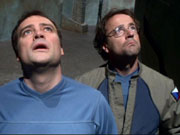
Fans hope that the adventures of the Atlantis expedition are far from over.
DN: I think so, definitely. What a good question. And what a journey. I watched some of the footage from “The Storm” and some of the earlier ones in Season One. And we were kids! [Laughter]
It’s crazy to think that five years is going to change that around. But as the show went on and became a little darker, and some of things that were touched upon — with the retrovirus and what it is to be a human and some of the big topics that sci-fi can touch on, I don’t think you can be a player in that universe without making some decisions that you regret. Or some decisions that have been difficult to make.
It’s the building blocks of character. And it’s sort of how you get up the next day and look at yourself in the mirror. I’m speaking as the character now. We’ve all had moments like that. Where your life is in danger all the time. And under those kinds of circumstances where you’re doing that every day for five years, you do grow up. And you do mature fast. That was a nice change. That was a nice sort of evolution for the character.
And also, he came into his own. He wasn’t so “Oh, excuse me! Excuse me! Can I? Can I?” There was a bit more confidence that came in towards the end. Good to see.
GW: When you speak of mistakes, are you thinking of Zelenka’s mistakes as a scientist?
DN: Yeah. The mistakes that you make. Because when you’re at that level where the stakes are so high, a miscalculation or a mistake can cost lives. There is the value towards what the mistake means. That’s what responsibility is about, right?
Interview by Chad Colvin and Darren Sumner. Transcript by Chad Colvin.

